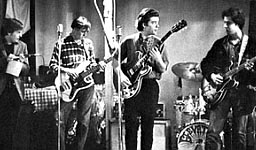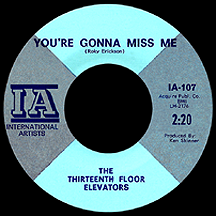THE THIRTEENTH
FLOOR ELEVATORS
You're Gonna Miss Me
Some influential psychedelic sounds were coming out of Texas in the mid 1960s, and The Thirteenth Floor Elevators were the most notorious act on the scene. Tommy Hall envisioned the group as the rock equivalent of a jug band. His instrument, in fact, was a ceramic jug, which he blew right into a microphone, creating a wobbly air effect that is the signature sound on most of the band's records. Stacy Sutherland took the more traditional role of lead guitarist. Roger "Roky" Erickson rounded out the core trio on guitar, harmonica and lead vocals. Roky (pronounced the same as a certain cartoon squirrel) had a reputation around Austin in 1965, having fronted a group, The Spades, whose 45 of his song "You're Gonna Miss Me" on the Zero label was popular locally. Shortly after its release, he joined Hall and Sutherland in forming the Elevators.
By late '65, John Ike Walton had joined as drummer and Benny Thurman stepped in as bass player but left a few months later, replaced the following summer by Ronnie Leatherman in time for the band's ascension to national exposure. For the name, Walton suggested "The Elevators" and Hall's wife Clementine came up an idea based on popular superstition that had resulted in many tall buildings having no designated 13th floor, the elevators going straight from the 12th to the 14th. Hall, Sutherland and Erickson were into experimenting with drugs at the time, and the "missing floor" angle sounded just fine to them. They recorded their own version of "You're Gonna Miss Me" for the local Contact label, then in early 1966 it was released for national distribution on William Hanna and Joseph Barbera's HBR Records. The Spades' harmonica-driven original was a solid rocker; Erickson's screaming vocals and Hall's unique jug sound took the Thirteenth Floor version to a new level of delirium. By summer, Houston label International Artists (whose staff included producer Lelan Rogers, brother of soon-to-be First Edition lead singer Kenny Rogers) offered the group a contract, pressed the record on their IA label, and set a priority on promoting the song nationally. In October of the peak year of the garage band era, the song, harder-edged than most, made it to number 50 on the Cash Box chart, falling a little shy of that position in Billboard.
The band was into marijuana and the not-yet-illegal LSD from the start. On an American Bandstand appearance, when Dick Clark asked Tommy Hall who the head of the group was, he replied, "We're all heads!" The heavy drug use of the three founding Elevators would be the main cause for the group's quick disintegration. The next single, "Reverbaration (Doubt)," from the group's debut album, Thirteenth Floor Elevators (also known as The Psychedelic Sounds of the 13th Floor Elevators), received some airplay in late 1966, but interest in the song was minimal. In the summer of 1967 Walton and Leatherman departed, preferring not to partake in the sizeable amounts of hallucinogenics the others had made an everyday routine of. South Carolina-born Danny Thomas, the only Elevator not from Texas, took over on drums. Dan Galindo became the new bass player that summer but quit by the end of the year, replaced by Duke Davis, who left just a few months later, after which Leatherman relented and returned. A well-reviewed but poor-selling album, Easter Everywhere, was released by International Artists around the same time.

While studying sociology at Lamar University in Beaumont, Texas, Janis Joplin sometimes performed as a solo act in Austin. Opening for the Elevators (who often purposely performed under the influence of LSD), she became friends with the group through their mutual interest in music and mind-expanding drugs. As she was heading to San Francisco to set the world ablaze with Big Brother and the Holding Company, the Elevators had just about made it to the 14th floor...the end was near. Though several more singles were released in '68 and '69, in addition to a live album, the drugs were taking their toll; each member of the group was busted for possession at least once, and other than Sutherland, who hung in there until the end (and did most of the creative work on Bull of the Woods, the band's final album), they just weren't functioning well as a unit...or as individuals, for that matter.
Being strong proponents of drug use, the Elevators were probably the closest thing to a psychedelic act in the literal sense of the word and their deterioration was more rapid than for most of the era's more troubled bands. In 1969, Roky Erickson was arraigned once again on a pot possession charge. Pleading insanity, he was committed to a psychiatric hospital in Houston where it's been said he received shock treatments. Stacy Sutherland developed a dependence on heroin and spent several years in prison on drug charges. In 1978, he was shot and killed by his wife as the result of an argument they were having.
Fate stepped in when Elektra Records released the 1972 compilation album Nuggets: Original Artyfacts from the First Psychedelic Era, a collection of garage band highlights from 1964 through 1968. It probably didn't occur to anyone at the time that the album would create an entire avenue of inspiration for the punk rock movement later in the decade and that inclusion could perhaps immortalize an act in the eyes of burgeoning punk musicians and fans of the genre. Many of the songs included on the double set were big hits, but a handful of lesser-known, previously overlooked acts who made the cut developed huge cult followings as a result. "You're Gonna Miss Me" was chosen as one of the collection's 27 songs and the popularity of The Thirteenth Floor Elevators has become more widespread with each successive year.


